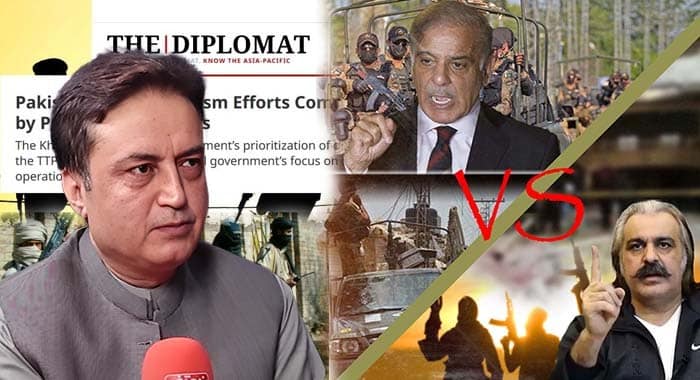Arif Yousafzai
Khyber Pakhtunkhwa today stands at the epicenter of Pakistan’s new wave of terrorism, suffering colossal losses on both sides of the conflict. From targeted intelligence-based operations to relentless militant attacks, the province is caught in a cycle of bloodshed. Yet, while the security forces shoulder the brunt of this war, the political leadership continues to indulge in rhetoric, contradictions, and outright denial.
Just this week, The Diplomat highlighted that government policies regarding Khyber Pakhtunkhwa have themselves become an obstacle in counter-terrorism efforts. The fact is stark: there is no unity of purpose between the federation, the security apparatus, and the provincial government. Instead of working in cohesion, each side is engaged in a blame game, further aggravating an already perilous situation.
On the ground, Pakistan’s security forces are locked in a full-fledged war. Intelligence-based operations (IBOs) are conducted almost daily across Khyber Pakhtunkhwa and the tribal districts. In the last 48 hours alone, 19 militants were killed in Bajaur and Bannu, while another 10 fell in Dir. The Taliban, however, are equally prepared launching sophisticated attacks on convoys, compounds, and police stations, even employing drone technology.
This is not a one-sided war. Both sides are suffering heavy casualties, and the conflict shows no sign of abating. Yet, the missing link remains political ownership. The federation offers occasional statements and half-hearted rhetoric, but it is far from displaying the seriousness required to confront militancy. The provincial government, meanwhile, goes a step further denying operations, refusing to acknowledge internally displaced persons (IDPs), and distancing itself from the very security actions being carried out under its mandate.
The contradictions become most visible in the case of Chief Minister Ali Amin Gandapur. For months, he and his ministers have repeatedly claimed that they should be allowed to go to Afghanistan to negotiate peace or send jirgas. Yet when PTI Chairman Imran Khan recently “ordered” Gandapur to travel to Kabul, the chief minister suddenly backtracked, citing his blocked passport as an excuse.
For eight to nine months, the public was told that peace could only come through dialogue facilitated by the Khyber Pakhtunkhwa leadership. When the moment came, excuses were offered. It is difficult to avoid the conclusion that such statements were hollow political gimmicks, not serious strategies. If the leadership cannot even resolve issues like passports while holding the highest offices of the province, how can they claim to solve militancy?
This is not just about one chief minister. The broader problem lies in the PTI leadership’s politics of contradiction. Imran Khan’s entire political career has been marked by the gulf between words and deeds. He spoke of eradicating corruption, yet his own government became mired in the same scandals of bureaucracy, police, and secretarial corruption as its predecessors. He claimed to oppose military operations, yet his government silently allowed them, creating IDPs while publicly denying the actions.
The people of Khyber Pakhtunkhwa deserve clarity, not duplicity. Either take ownership of the counter-terrorism operations or step aside for someone who can. Playing both sides—allowing operations but denying them in public—is not just political hypocrisy, it is outright dangerous for the nation’s stability.
Recent Counter Terrorism Department (CTD) reports underline Dera Ismail Khan as one of the most affected districts, plagued by repeated militant attacks. Ironically, this is the home district of both the chief minister and the governor. If the leadership cannot secure their own stronghold, how can they possibly claim to secure the rest of Khyber Pakhtunkhwa? Militants now roam openly in broad daylight, as videos from the region confirm. This is not governance; it is surrender.
The solution lies not in rhetoric but in seriousness. If the federation, provincial government, and security institutions do not come to the same page, the war will continue indefinitely. We need an All Parties Conference that goes beyond speeches and delivers actionable consensus. Whether through operations, jirgas, or negotiations with Kabul, Pakistan must find a unified approach.
If the current leadership cannot provide that unity, then it is their moral duty to vacate their seats. Governance is not about enjoying privileges, corruption, and power; it is about protecting the people. The nation cannot afford rulers who thrive on political theatrics while soldiers and civilians bury their dead.
Khyber Pakhtunkhwa has already paid the price of two decades of war. It cannot be left again to the politics of contradictions. If peace requires dialogue, then let the jirgas go. If peace requires operations, then own them openly. But do not fool the people with empty statements while the province bleeds.
The people deserve leadership that will face reality, not run from it.





